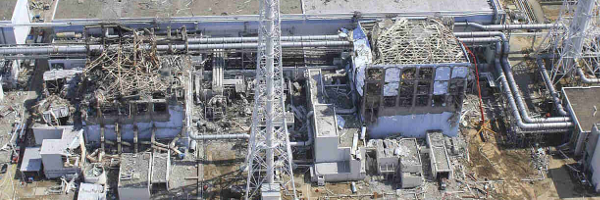October 28, 2016
Something richly Life-affirming occurred this past August. Expressed in the Montreal Declaration for a Nuclear-Fission-Free World, its two opening paragraphs provide the context:
As citizens of this planet inspired by the Second Thematic World Social Forum for a Nuclear-Fission-Free World, conducted in Montreal from August 8 to August 12, 2016, we are collectively calling for a mobilization of civil society around the world to bring about the elimination of all nuclear weapons, to put an end to the continued mass-production of all high-level nuclear wastes by phasing out all nuclear reactors, and to bring to a halt all uranium mining worldwide.
This call goes out to fellow citizens of all countries worldwide who see the need, whether as an individual or as a member of an organization, for a nuclear-fission-free world. We are committed to building a global network of citizens of the world who will work together, using the internet and social media to overcome isolation, to provide mutual support and to coordinate the launching of joint actions for a world free of nuclear fission technology, whether civilian or military.
The hyperlink-rich Declaration, along with ongoing News and Developments, is available on <ratical.org>. The list of endorsers continues to grow.
Beyond the Montreal Declaration, significant momentum is occurring in the movement to stigmatize and ban nuclear weapons—the only remaining Weapon of Mass Destruction as compared with biological weapons, chemical weapons, land mines, and cluster munitions—that is not yet banned by international law outlawing their use.
In an address to the nation on July 26, 1963, President Kennedy began by saying:
Good evening, my fellow citizens:
I speak to you tonight in a spirit of hope. Eighteen years ago the advent of nuclear weapons changed the course of the world as well as the war. Since that time, all mankind has been struggling to escape from the darkening prospect of mass destruction on earth. In an age when both sides have come to possess enough nuclear power to destroy the human race several times over, the world of communism and the world of free choice have been caught up in a vicious circle of conflicting ideology and interest. Each increase of tension has produced an increase of arms; each increase of arms has produced an increase of tension.
In these years, the United States and the Soviet Union have frequently communicated suspicion and warnings to each other, but very rarely hope. Our representatives have met at the summit and at the brink; they have met in Washington and in Moscow; in Geneva and at the United Nations. But too often these meetings have produced only darkness, discord, or disillusion.
Yesterday a shaft of light cut into the darkness. Negotiations were concluded in Moscow on a treaty to ban all nuclear tests in the atmosphere, in outer space, and under water. For the first time, an agreement has been reached on bringing the forces of nuclear destruction under international control – a goal first sought in 1946 when Bernard Baruch presented a comprehensive control plan to the United Nations.
Previously, on June 10, 1963, in his address to the graduating class at American University, President Kennedy proposed nothing less than an end to the Cold War. The speech was, and still is, way ahead of its time. Two moments in the address are especially noteworthy. The first place when applause occurred that caused JFK to pause and repeat 5 words was, in the film, at 22:03: “Chairman Khrushchev, Prime Minister Macmillan, and I have agreed that high-level discussions will shortly begin in Moscow looking towards early agreement on a comprehensive test ban treaty. Our hope must be tempered – Our hopes must be tempered with the caution of history…” and again, at 22:37: “the United States does not propose to conduct nuclear tests in the atmosphere so long as other states do not do so. We will not – We will not be the first to resume.” President Kennedy risked everything in his limited time to end the cold war and move away from the brink of nuclear annihilation. That work for us today revolves around ending the “global war on terror” and eliminating nuclear weapons — as well as nuclear power and uranium mining—the necessary ingredient for both weapons and power.
Yesterday, on October 27, 2016, a new shaft of light cut into the darkness. The First Committee of the UN General Assembly adopted resolution L.41 to convene negotiations in 2017 on a “legally binding instrument to prohibit nuclear weapons, leading towards their total elimination”. The voting result was 123 nations in favour, 38 against, with 16 abstentions. 57 nations co-sponsored the resolution:
Angola, Austria, Bahamas, Belize, Brazil, Burundi, Cabo Verde, Chile, Costa Rica, Democratic Republic of the Congo, Dominican Republic, Ecuador, Egypt, El Salvador, Fiji, Guatemala, Grenada, Guinea-Bissau, Honduras, Indonesia, Ireland, Jamaica, Kenya, Liberia, Libya, Liechtenstein, Malaysia, Malawi, Malta, Marshall Islands, Mauritania, Mexico, Namibia, Nauru, New Zealand, Nigeria, Palau, Panama, Papua New Guinea, Paraguay, Peru, Philippines, Saint Lucia, Saint Vincent and the Grenadines, Samoa, San Marino, Sierra Leone, South Africa, Sri Lanka, Swaziland, Thailand, Trinidad and Tobago, Tuvalu, Uruguay, Venezuela, Viet Nam, Zambia.
These developments provide inspiration and energetic motivation to join with other people, where you live and across the globe, to support, advocate, and educate on behalf of negotiations in 2017 to establish a legally binding instrument to prohibit nuclear weapons, leading to their total elimination. As described by the International Campaign to Abolish Nuclear Weapons (ICAN), Resolution L.41:
acts on a recommendation made in August by a UN open-ended working group on nuclear disarmament in Geneva. More than 100 nations participated in the working group, with an overwhelming majority expressing their support for the prohibition of nuclear weapons as a first step towards elimination.
The resolution sets up a negotiating conference to be held over 20 days (from 27 to 31 March 2017 and from 15 June to 7 July 2017), at the UN in New York. All UN member states, along with international organizations and members of civil society, will be invited to participate. The negotiations could continue beyond these dates.
A treaty prohibiting nuclear weapons would close the “legal gap” in the existing regime governing nuclear weapons, as recognized by the Humanitarian Pledge. It is an anomaly that these are the only weapons of mass destruction not yet prohibited under international law in a comprehensive and universal manner.
As Dr. Gordon Edwards, President of the Canadian Coalition for Nuclear Responsibility explains in a letter he wrote today,
Of course, the nuclear-weapons states hope to boycott these negotiations, and the members of NATO—a military alliance that espouses nuclear weapons as “essential” for its security—will also want to shun the proceedings. But there is a catch. Under the terms of the Nuclear Non-Proliferation Treaty (NPT) these states are all legally obligated to undertake negotiations of exactly this nature. They can boycott the negotiations, but in doing so they will be in clear violation of their existing treaty obligations….
Common sense tells us that the nuclear-armed countries are not going to submit easily to such legalistic considerations, but the upcoming negotiations will put them on the defensive in the court of public opinion. With examples such as the fall of the Berlin Wall, the collapse of the apartheid regime in South Africa and the dissolution of the Soviet Empire in mind, no one should dismiss the power of mobilized public opinion—especially when it is in concert with legal and political pressures, all of them focused on the same goal: a legally-binding commitment to ban all nuclear weapons from the Earth.
The UN resolution passed yesterday, and the negotiations to begin next year, will not by themselves bring about the elimination of nuclear weapons, but the mobilization of people of good will world-wide may be enough to seal the deal. One thing is for sure. We will never know unless we try.



